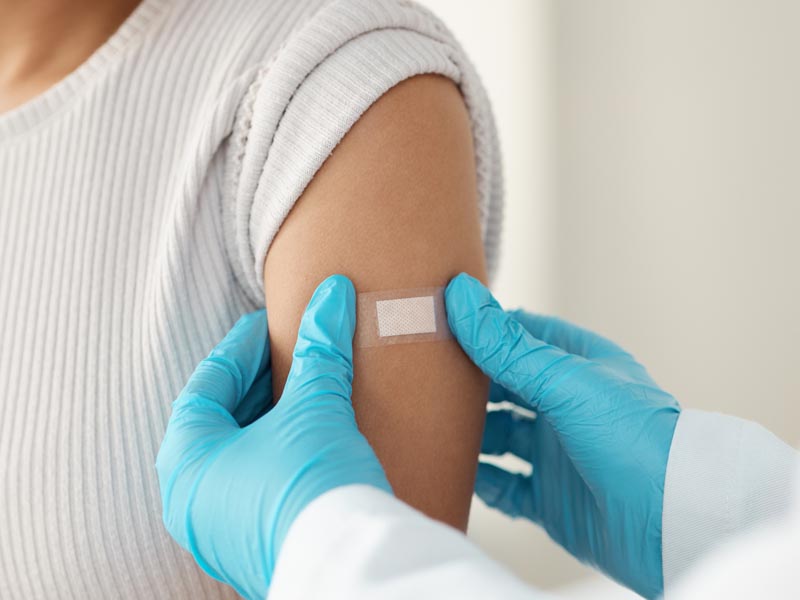Vaccine Survey: Public Mostly Unconcerned About COVID-19
AAFP Resources Can Aid in Crucial Patient Conversations
Dec. 6, 2023, News Staff —COVID-19 continues to be a substantial burden on public health nearly four years after its emergence, yet only one-fifth of American adults have received the latest COVID-19 vaccines and half of all adults are not taking other steps to protect themselves or their loved ones from infection.

Those are among the findings from the latest Kaiser Family Foundation Vaccine Monitor survey, which highlight the challenges family physicians are likely to face in practice during the holiday season. At the same time, the survey results serve to remind family physicians of Academy resources that can help them have effective conversations with patients about getting vaccinated against COVID-19 and other infectious diseases, such as influenza and RSV.
Survey Results: By the Numbers
Overall, 20% of adults surveyed said they received an updated COVID-19 vaccine, which first became available in September; another 28% said they would definitely or probably get an updated vaccine. Black adults, those age 65 years and older and people who identified politically as Democrats were among the groups most likely to report getting an updated vaccine.
Although the percentage of adults who received an updated vaccine was low, awareness was high, with 79% of participants reporting they had heard at least “a little” about them.
Story Highlights
Other highlights:
- More than half of respondents (51%) said they probably or definitely will not get an updated vaccine. This included 31% of all adults who previously received a COVID-19 vaccine.
- A majority (52%) of previously vaccinated adults who have not received an updated vaccine said they weren’t worried about getting COVID-19. Another 37% said they were too busy or didn’t have time to get vaccinated and 32% said they were waiting to get a vaccine later.
- Only 28% of respondents said they were very or somewhat worried about getting seriously sick from COVID-19, the lowest recorded percentage since June 2021. Similarly, only 26% of adults were worried about getting COVID-19 over the holidays, and only 31% were worried about spreading the virus to people close to them.
- On the other hand, 46% of adults said they were very or somewhat worried about an increase in COVID-19 cases and hospitalizations this winter.
- Exactly 50% of respondents said they were taking at least one of five precautions (wearing a mask in crowded places, avoiding large gatherings, avoiding indoor restaurant dining, taking a COVID-19 test before visiting friends or family and avoiding travel) to reduce health risks because of COVID-19 during the holidays.
Although the survey did not explore the reasons behind the apparent lack of concern about getting sick from COVID-19 or receiving an updated vaccine, it should be noted that this year’s COVID-19 vaccination campaign experienced significant difficulties with supply chain issues and insurance coverage, which likely impeded vaccine access in the campaign’s first few weeks.
COVID-19 continues to infect hundreds of people each day, with several variants of the virus currently in circulation. In addition, CDC data indicate substantial increases in related emergency department visits and hospitalizations from the week ending Nov. 4 to the week ending Nov. 18, the latest period for which information is available. Given this evidence, it’s important that family physicians help their patients protect themselves from COVID-19 and other respiratory diseases this winter.
Although persuading some people to get the updated COVID-19 vaccine can prove challenging, AAFP members can rely on Academy resources to help them at each step. Members can get the latest information on COVID-19 vaccines and treatments at aafp.org and through articles in American Family Physician and FPM, and they can refer patients to an article at familydoctor.org on how to debunk common COVID-19 myths.
In addition, a 2022 report authored by two AAFP Vaccine Science Fellows showed that many family physicians use motivational interviewing, along with facts and data, to increase patient confidence and acceptance of vaccines.
Resources such as an FPM Quick Tips blog post on the OARS (open-ended questions, affirmations, reflective listening, summarize) technique for motivational interviewing, as well as a video series on promoting immunizations, demonstrate how this technique can increase vaccination rates among hesitant patients.
For parents who have concerns about vaccinating their children, the Academy has a free online CME activity designed to improve COVID-19 vaccination rates in infants and young children.
And as always, members are encouraged to visit the Academy’s Immunizations and Vaccines webpage for more resources and guidance.